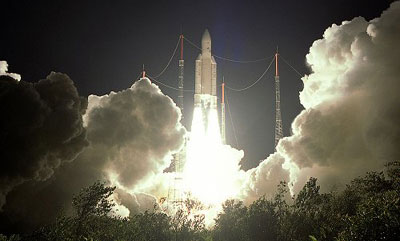French military space policy: more of the sameby Taylor Dinerman
|
| In fact, Sarkozy and his government are continuing a long-standing strategy that owes more to the industrial ambitions of France’s military industry than to their supposed ambition to play a major role on the world stage. |
The unspoken hope is that one day the US will leave or be kicked out of Europe, and that Europe’s governments will then panic and increase their defense spending from roughly two percent of GDP to something closer to four percent. When this happens French industry will be in a position to harvest the vast majority of these new procurement contracts. In preparation for this glorious day, France has continued a policy of developing and buying a little bit of everything, often alone and sometimes with other EU states, but never with the US. Its neighbors are content to develop their own specialist areas of excellence and to collaborate with each other and even with the Americans.
A dissident group of senior officers, calling themselves “Surcouf”, writing in Le Figaro, attacked the policy for exactly this reason. They speak of “une conception de la defense centree sur les ‘Programmes d’equipments’ aboutissait a une depense public considerable pour une utlite operationelle faible.” [A defense concept centered around hardware procurement resulting in a weak operational capacity achieved at considerable cost to the public purse.] Such problems are not unknown elsewhere, but it seems that in France things are taken to an extreme.
It is no wonder then that the members of “Surcouf” refer to the new military space programs as a “gadget”. After all, they are the ones who have had to command underequipped and overengaged troops for as long as they can remember. When French troops go to war they almost invariably lack sufficient basic modern gear such as night vision goggles or electronic warfare pods. France, like many other European governments, has been good at buying highly visible weapons like fighters and tanks, but then fail to buy the add-ons that make these systems effective.
Strategically, the decision to spend more on spacecraft and space operations can be considered an “add-on” to France’s overall military force. Better intelligence and early warning are not, by themselves, going to make France or a French-led European army victorious. Without them, though, there is no hope that Europe will ever be able to stand on its own. The goal of integrating all existing and future European spy and remote sensing satellites into a single analytical matrix makes perfect sense.
Building a European early warning network also fits nicely within this logic. This year they plan to launch two Spirale missile detection technology development satellites as ride-along payloads on an Ariane 5. The two 130-kilogram satellites will be sent into a highly elliptical orbit on a one-to-two-year mission to prove out the technology and to help develop a database on the characteristics of launchers and other phenomena.
| France is not waiting for the other EU states to agree to join its number one new military space program, a sigint/elint spacecraft called CERES that it hopes to launch in the middle of the next decade. |
In addition to building new infrared satellites to detect missile launches and perhaps for other purposes such as battlespace characterization, France wants to build one or more large, powerful radars similar to the US Pave Paws and other long-range warning and tracking ones. Taken together with the satellites, this will give a future French president, perhaps even Sarkozy if he wins a second five-year term, the option of building a standalone missile defense system. Already France and its partners, Britain and Italy, are building the Aster missile that may eventually have capabilities similar to US Patriot, THAAD, or the sea-based SM-2+.
France is not waiting for the other EU states to agree to join its number one new military space program, a sigint/elint spacecraft called CERES that it hopes to launch in the middle of the next decade. According to a government press release France is them only European nation to master the technology and operational skilled needed for such satellites.
Within current budgetary limits, Sarkozy’s government has not changed basic French strategy as it has existed since de Gaulle left office in 1969. The consensus has remained unchallenged by governments of both the right and the left. The role of space in French strategy has in fact remained high on their to-do list.
The enduring question is not what France wants—that is evident—but what do the other European nations want? Are they willing to trade their relations with the US for a new European defense identity? So far the answer has been no, but will the prospect of a European space force change this? That may depend more on the US and its next president than on Europe’s leaders and their collective or national goals.
